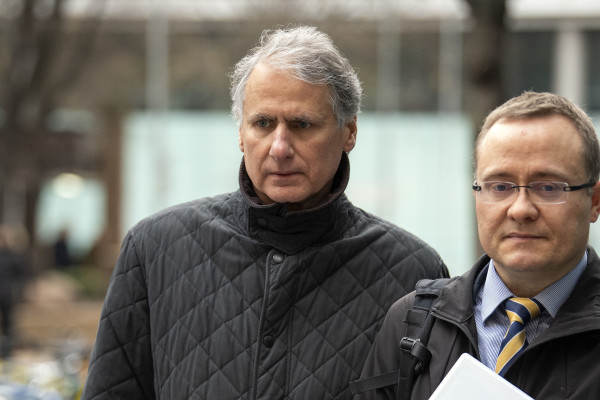

Ex-chief executive John Varley, 62, and former colleagues – Roger Jenkins, 63, Tom Kalaris (pictured, left), 63, and 60-year-old Richard Boath – raised £11.8bn in emergency fundraising in 2008.
But the deal - which allowed the bank to avoid taking a taxpayer bailout - was allegedly covered up by the bankers to protect their enormous bonuses.
Prosecutors allege they knowingly hid £322m in fees, paid in return for the Qatari investment to avoid looking weak and triggering a loss of confidence in the bank.
A loss of confidence could have threatened the company's future as an independent bank, requiring direct government intervention, which would likely have led to the dismissal of Barclays top brass.
It is alleged by prosecutors that they hid the vast fees in a separate agreement that was purportedly for 'advisory services,' but that this was really a cover to hide the higher investment commission fees.
Today (January 24) jurors heard a recording of a conversation between former Barclays executives Kalaris and Boath where Kalaris joked he didn't want to go to jail as a result of the secret payments because "the food sucks and sex is worse".
In the call played to the jury, they discuss how the services agreement, supposedly for advice from the Qataris, would be kept distinct from the investment fees, called the subscription agreement.
Boath explains to Kalaris that the bank's position will be that "whatever we do will not be related to this subscription agreement, but frankly we all know that whatever we enter into we are entering into in exchange for the subscription agreement."
Kalaris replies: "Yeah, yeah that's right. None of us wants to go to jail here."
"It ain't worth it and apparently the food sucks," replies Boath.
"No, the food sucks and sex is worse," jokes Kalaris.
Earlier today Prosecutor Ed Brown QC said: "The Qataris wanted a trade, they wanted a return on their capital investment in Barclays and it was agreed to be by Barclays 3.25 per cent.
"In early June (2008) a colleague was to say to Boath, 'They've got us by the balls' to which Boath agreed."
Mr Brown added that later in June, Boath said of a Qatari negotiator: "What he doesn't realise is that if he doesn't come through with his money we're f**ked."
The four all deny conspiracy to commit fraud by false representation in relation to the emergency fundraising which allowed Barclays to avoid direct governmental intervention.
The prosecutor told the jury how senior staff at the bank had expressed concern at the scheme, fearing that it would be unacceptable to shareholders whose dividends were half what the Gulf state was being paid for their investments.
The jury heard how Joanna Baker, the head of the bank's corporate development, was asked to come up with a way of paying the Qataris the inflated rate.
But she expressed concern that there was no acceptable way to make that payment without disclosing it to the wider market.
Ms Baker was asked to see if there were any options or opportunities to structure the deal differently but there was no proposal that she could find that allowed her to do it, according to Mr Brown.
Mr Brown told jurors that Ms Baker had said that the advisory services agreement was essentially a mask for secretly paying the commission of 3.25 per cent but she believed her concerns had been escalated to the board.
Mr Brown said: "She was reassured that the board of Barclays had seen the information, had considered all the facts and had reached a decision on that basis to enter into the agreement.
"She was misled in this regard."
Mr Brown told how the advisory agreement was extremely vague about the services and did not include any kind of description of them.
Varley, of Notting Hill, Jenkins, of Malibu, California, Kalaris, of Knightsbridge, and Boath, of Henley-on-Thames, Oxfordshire, deny fraud by false representation, between 1 May 2008 and 31 August 2008.
Varley and Jenkins deny a second like charge of fraud by false representation, between 1 September 2008 and 30 November 2008.
The trial continues.


